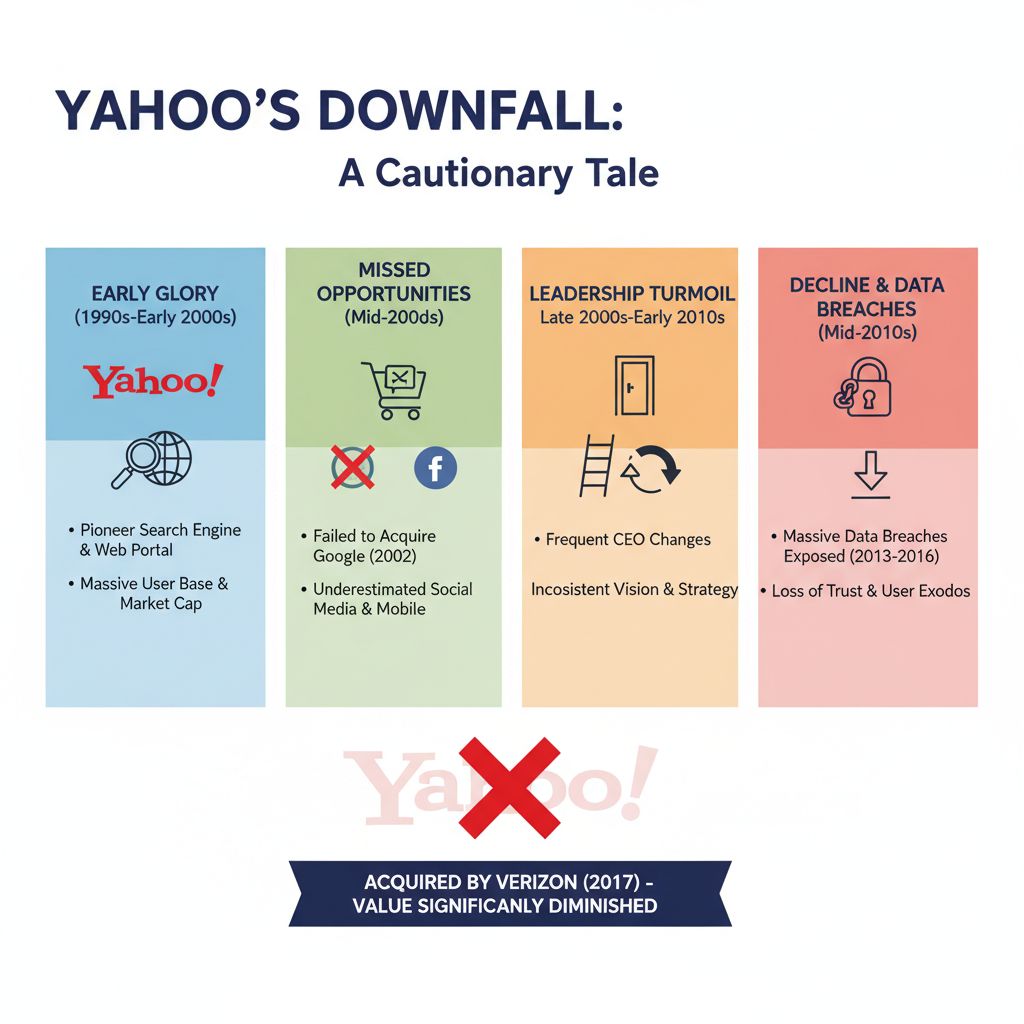Yahoo was once the internet’s guiding star. When the years 2000 began, it was your all-in-one portal for news, email, searching, and even entertainment. You couldn’t even imagine surfing the web without typing in “yahoo.com.” Nowadays, Yahoo is just an exemplary case study — evidence of just how quickly even giants could fall. So, why did Yahoo fail? Let’s examine the real reasons for the fall of one of the oldest empires of the internet.

Yahoo began robustly in 1994 when it was conceived as a web directory by David Filo and Jerry Yang. At that time, the internet was yet new, and users lacked an avenue to locate websites conveniently. Yahoo made the web more coherent, giving users a hospitable portal replete with links, news, and mail services.
By the end of the 1990s, Yahoo wasn’t only popular — it was the internet itself. It had millions of users each day, robust brand awareness, and highly lucrative ad agreements. For a time, it seemed untouchable.
Success, however, is deceiving. While Yahoo was basking in its superiority, new entrants such as Google were stealthily rewriting game rules.
Among the major reasons for Yahoo losing was its succession of missed chances. Time and again, Yahoo had the possibility of making savvy buyouts but flinched or made incorrect decisions.
For instance, in 2002, Yahoo could have purchased Google for just $1 billion. It rejected the offer, terming the price “too high.” Ironically, years later, Google was the globe’s best search engine — one that would eventually surpass Yahoo itself.
Yahoo again made another great mistake when it bought GeoCities and Broadcast.com for billions, and it just sat back and waited for them to wither away without innovation. Then, Yahoo could’ve acquired Facebook for $1 billion in 2006, but once again, it didn’t consummate the deal. Mark Zuckerberg turned down the offer, and we all know how that ended up.
But,
Chaos in Leadership and Visionary Vacuum
However, another major reason for the downfall of Yahoo was its uncertain leadership. From 2007 to 2012, Yahoo went through multiple CEOs, who had differing strategies and visions. Instead of following one path, the organization kept on changing gears — following trends rather than leading trends.
While Google and Facebook had definitive missions, Yahoo was uncertain both who it was and who it wanted to be. Was it a media entity? A search engine? An IT innovator? It, in vain, attempted all three and failed at all three.
Inconsistent leadership produced confusion in the organization, inhibiting innovation and crushing spirits. This indecisiveness gave competitors the opportunity to pull ahead while Yahoo floundered trying to get its bearings.
Yahoo’s inability to win in the search engine market was likely its costliest error. Google aimed to create a faster, more intelligent, and more relevant algorithm-powered search experience. Yahoo, meanwhile, was dependent on manual curation and antiquated systems.
Once users discovered Google was returning better results, they defected. Advertising soon followed the users, and ad revenue for Yahoo plummeted. Despite acquiring search technologies and forming an alliance with Microsoft, lost ground was never regained by Yahoo.
By the time Yahoo tried to catch up, it was already too late. Google had become synonymous with search, while Yahoo’s brand started to fade into nostalgia.
Yahoo Mail used to be among the globe’s favorite email services. But when Gmail was introduced with larger storage, cleaner appearance, and more brilliant features, Yahoo could not keep pace fast enough.
While others highlighted user experience, Yahoo crammed its products with bothersome ad insertions and disorienting layout designs. This only frustrated users and prompted them towards competitors. This same cycle was repeated in yet another of Yahoo’s products, Yahoo Messenger, and all lost competitiveness due to innovation failures.
Flickr, for one, was once at the forefront of sharing photographs. But Yahoo failed to develop it properly. When Instagram and others picked up pace, Flickr lost its momentum.
Dzi
Loss of Trust and Security Breach
Identity Theft:
Yahoo misfortunes did not end in weak leadership. From 2013 to 2014, the internet giant faced massive data breaches, and personal data from over three billion accounts was compromised. It was one of the biggest data breaches in history.
Worse still, Yahoo waited to notify users of the hack, causing even more harm to its reputation. Trust once broken is difficult to restore — and for Yahoo, this was the coup de grâce. Users started leaving the site, and its reputation never recovered.
____________________________
Acquisition and Aftermath
Yahoo’s better days were gone long ago by 2017. Verizon Communications bought Yahoo’s core internet business for roughly $4.48 billion — just a fraction of the company it was worth once upon a time. It was a melancholy close for a tech icon that had been worth more than $125 billion once.
The transaction was more than just an acquisition, it was the end of an era. Yahoo had transformed from internet pioneer to case study in lost potential and executive failure.
____________________________________
Lessons from Yahoo’s Demise
yahoo’s past is replete with important lessons. Innovation is perpetual, and it is dangerous for firms to relax and bask in their own successes. Continuity of leadership, clear vision, and receptiveness to innovation are critical in the fast-evolving tech landscape.
More importantly, the fall of Yahoo demonstrates that brand power is in itself not enough. Unless innovation and end-user interest keep coming, even the biggest firms disintegrate.
No,
Conclusion
Our analysis
So why did Yahoo lose? Its errors included complacency, poor decision-making, confused leadership, and failure to innovate. Yahoo lost more than the market — it lost its purpose for existence. But even in its downfall, Yahoo’s heritage is important. It opened the doors to today’s internet world, even though it does not currently dominate it, its history continues to motivate — and caution — tomorrow’s technology entrepreneurs not to stand still in an internet that never stands still.